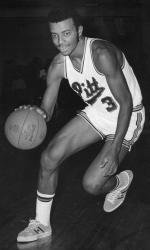With the 2019 NBA draft taking place next week, we will spend the days ahead taking a walk down memory lane with a choice collection of players who are celebrating an awesome anniversary this year. From a future Hall of Famer selected 2nd overall in 1959 (60th anniversary) through a conference POY picked in the 2nd round in 2009 (10th anniversary), these stars have all seen their dreams come true in past drafts. We continue our series with Bill Hillgrove, who did play-by-play for Pitt basketball in the 1970s when Billy Knight was turning into an All-American. After joining the ABA Billy became 1 of the best scorers in pro basketball, and after retiring he became a longtime NBA executive. HoopsHD’s Jon Teitel got to speak with Bill about the 45th anniversary of Knight leading his team to the Elite 8 and then getting drafted a couple of months later.
Knight was highly recruited out of Braddock High School in the Pittsburgh suburbs: what made him choose the Panthers? I think that it was the influence of assistant coach Tim Grgurich. The 1974 team could have been recruited on a trolley car since they were all from this area!
He averaged a double-double during each of his 3 seasons on the varsity: how was he able to balance his scoring with his rebounding? He was just a smooth player who had the gift to let the game come to him. His 1st game was on the road at Gettysburg and the NCAA did not declare him eligible until a few hours before the game, but he came out and it appeared that he had been there a long time. We were playing at UCLA in December of 1972 and I drove him in a rental car to Pauley Pavilion. We arrived only 23 minutes before tip-off, but he went out and scored 37 PTS: after the game Coach John Wooden walked across the court to shake his hand. It was an example of how he could just get his ankles taped, walk out on the court, and still play his best.
As a senior in 1974 his team won a school-record 22 straight games: did it reach a point where they expected to win every single time they stepped onto the court? I think that was the mindset: if they lost it was a shock to everyone.
In the 1974 Elite 8 he had 19 PTS/10 REB in a loss to top-ranked NC State: how was he able to play so well against the eventual national champs? We beat Furman before facing the Wolfpack on their home court. Coach Norm Sloan did not have to leave the state to win it all. Knight was the best player on the floor and he knew it. NC State had some great players like Tom Burleson/David Thompson but Thompson actually tripped over 1 of his own players and had to go to the hospital. Too bad that Pitt lost because they were a darn good team.
He finished that year by being named an All-American: what did it mean to him to receive such outstanding honors? For a kid from Braddock to get any national recognition was fantastic. It was a steel town that had collapsed.
In the 1974 NBA draft he was picked 21st overall by the Lakers (1 spot ahead of Truck Robinson): why did he decide to join the ABA instead? I think that I was part of that. I escorted him to an ABA game where Julius Erving was playing. We went to their locker room afterward and Dr. J sat down with Billy and convinced him that the ABA was the best option for him. I went to 1 of his 1st NBA games in Buffalo with my family: I noticed that every single time Billy got the ball Randy Smith clapped his hands and asked Billy to pass it to him!
In 1975 he scored 17.1 PPG for the Pacers and made the ABA All-Rookie 1st-team: how was he able to make such a smooth transition from college to the pros? He felt that he belonged, just like when he started his sophomore year at Pitt. He was relaxed, which was his calling card.
In 1977 he averaged 26.6 PPG (#2 in the NBA behind only Pete Maravich): what made him such a great scorer? He had a great jump shot and was a really great offensive rebounder. He could go inside or outside and had good hands: he was a pure delight to watch.
He later served in the front office of several different NBA teams: how did he enjoy being an executive compared to being a player? I think that he enjoyed the process very much. He would have liked to be athletic director at Pitt: it was not meant to be but he still comes back to campus to take part in different ceremonies.
He was later voted to Pitt’s all-time starting 5: when people look back on his career, how do you think that he should be remembered the most? He really remembers his roots and is just a great person. He is the best player in Pitt history even though we have had many great ones.

